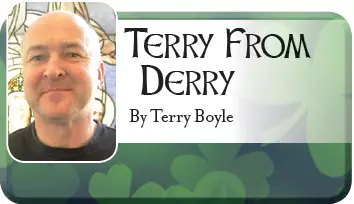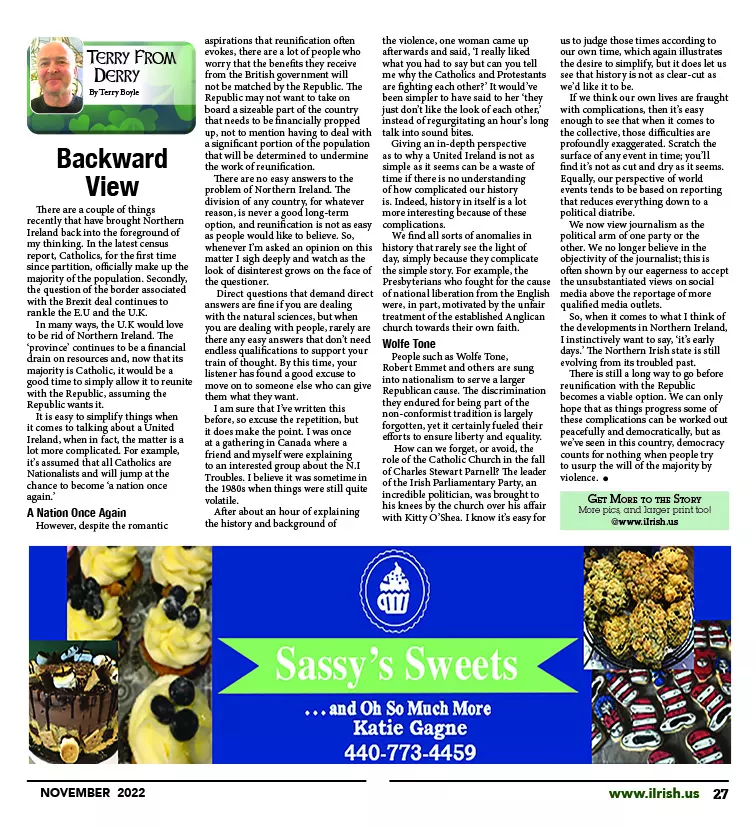Terry from Derry: Backward View
- John O'Brien
- October 30, 2022
- Edited 6 months ago
Table of Contents

Terry from Derry: Backward View
By Terry Boyle
There are a couple of things recently that have brought Northern Ireland back into the foreground of my thinking.
In the latest census report, Catholics, for the first time since partition, officially make up the majority of the population. Secondly, the question of the border associated with the Brexit deal continues to rankle the E.U. and the U.K.
In many ways, the U.K would love to be rid of Northern Ireland. The ‘province’ continues to be a financial drain on resources and, now that its majority is Catholic, it would be a good time to simply allow it to reunite with the Republic, assuming the Republic wants it.
It is easy to simplify things when it comes to talking about a United Ireland, when in fact, the matter is a lot more complicated. For example, it’s assumed that all Catholics are Nationalists and will jump at the chance to become ‘a nation once again.’
A Nation Once Again
However, despite the romantic aspirations that reunification often evokes, there are a lot of people who worry that the benefits they receive from the British government will not be matched by the Republic. The Republic may not want to take on board a sizeable part of the country that needs to be financially propped up, not to mention having to deal with a significant portion of the population that will be determined to undermine the work of reunification.
There are no easy answers to the problem of Northern Ireland. The division of any country, for whatever reason, is never a good long-term option, and reunification is not as easy as people would like to believe. So, whenever I’m asked an opinion on this matter I sigh deeply and watch as the look of disinterest grows on the face of the questioner.
Direct questions that demand direct answers are fine if you are dealing with the natural sciences, but when you are dealing with people, rarely are there any easy answers that don’t need endless qualifications to support your train of thought. By this time, your listener has found a good excuse to move on to someone else who can give them what they want.
I am sure that I’ve written this before, so excuse the repetition, but it does make the point. I was once at a gathering in Canada where a friend and myself were explaining to an interested group about the N.I Troubles. I believe it was sometime in the 1980s when things were still quite volatile.
After about an hour of explaining the history and background of the violence, one woman came up afterwards and said, ‘I really liked what you had to say but can you tell me why the Catholics and Protestants are fighting each other?’ It would’ve been simpler to have said to her ‘they just don’t like the look of each other,’ instead of regurgitating an hour’s long talk into sound bites.
Giving an in-depth perspective as to why a United Ireland is not as simple as it seems can be a waste of time if there is no understanding of how complicated our history is. Indeed, history in itself is a lot more interesting because of these complications.
We find all sorts of anomalies in history that rarely see the light of day, simply because they complicate the simple story. For example, the Presbyterians who fought for the cause of national liberation from the English were, in part, motivated by the unfair treatment of the established Anglican church towards their own faith.
Wolfe Tone
People such as Wolfe Tone, Robert Emmet and others are sung into nationalism to serve a larger Republican cause. The discrimination they endured for being part of the non-conformist tradition is largely forgotten, yet it certainly fueled their efforts to ensure liberty and equality.
How can we forget, or avoid, the role of the Catholic Church in the fall of Charles Stewart Parnell? The leader of the Irish Parliamentary Party, an incredible politician, was brought to his knees by the church over his affair with Kitty O’Shea. I know it’s easy for us to judge those times according to our own time, which again illustrates the desire to simplify, but it does let us see that history is not as clear-cut as we’d like it to be.
If we think our own lives are fraught with complications, then it’s easy enough to see that when it comes to the collective, those difficulties are profoundly exaggerated. Scratch the surface of any event in time; you’ll find it’s not as cut and dry as it seems. Equally, our perspective of world events tends to be based on reporting that reduces everything down to a political diatribe.
We now view journalism as the political arm of one party or the other. We no longer believe in the objectivity of the journalist; this is often shown by our eagerness to accept the unsubstantiated views on social media above the reportage of more qualified media outlets.
So, when it comes to what I think of the developments in Northern Ireland, I instinctively want to say, ‘it’s early days.’ The Northern Irish state is still evolving from its troubled past.
There is still a long way to go before reunification with the Republic becomes a viable option. We can only hope that as things progress some of these complications can be worked out peacefully and democratically, but as we’ve seen in this country, democracy counts for nothing when people try to usurp the will of the majority by violence.





